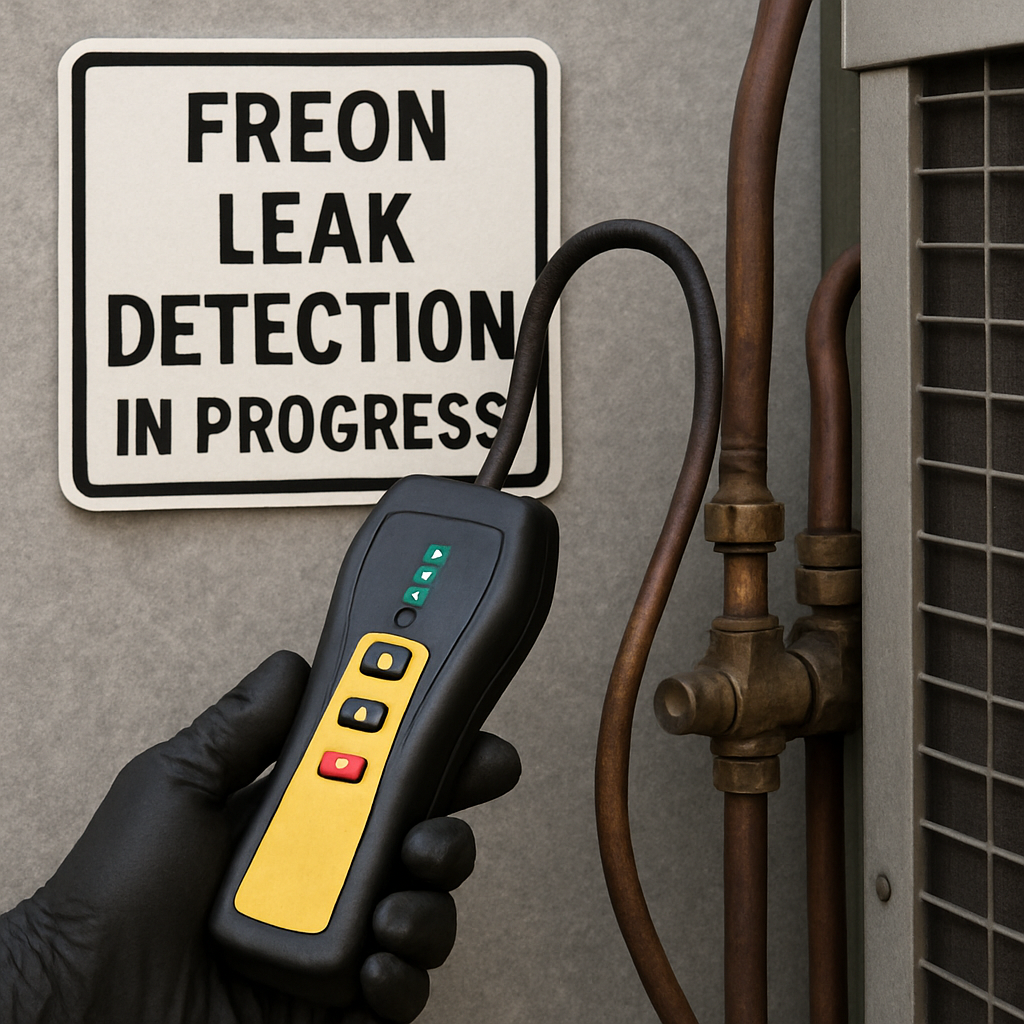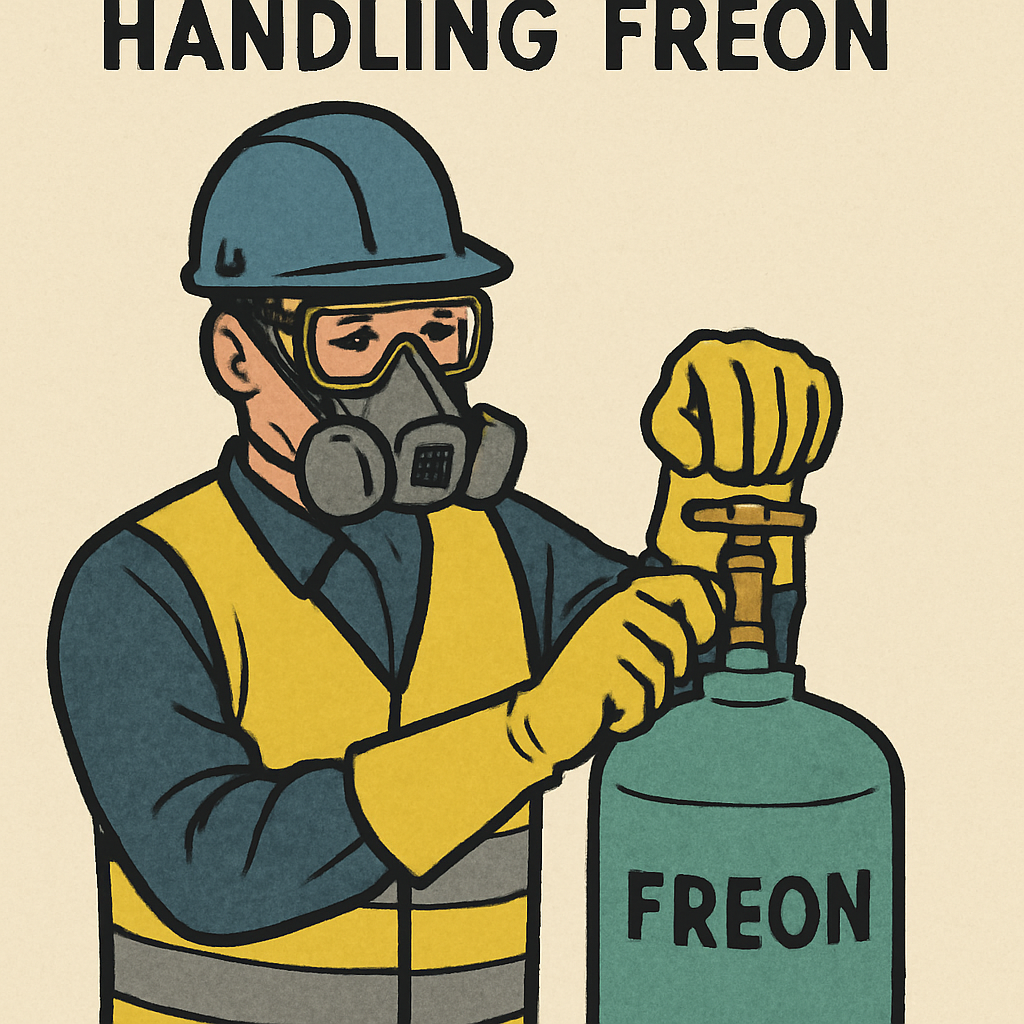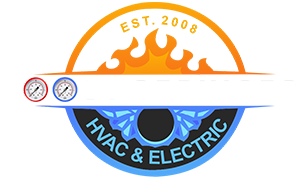At BOOST SERVICES, we pride ourselves on being a trusted HVAC contractor in Pasadena, specializing in both residential and commercial properties. Our commitment to quality service and client satisfaction means we’re here to help you navigate the ins and outs of HVAC care, including Recognizing Freon issues. Whether you’re dealing with a minor maintenance issue or a significant repair, our team is equipped to handle it all with expertise and efficiency.
Freon is a term commonly used to refer to a variety of refrigerants used in air conditioning and refrigeration systems. It belongs to a group of chemicals known as chlorofluorocarbons (CFCs) and hydrochlorofluorocarbons (HCFCs). These compounds have been essential in cooling systems for decades due to their efficiency in heat absorption and transfer. However, environmental concerns have led to the phasing out of certain Freon types, necessitating awareness and adjustments in HVAC practices.
Refrigerants like Freon are crucial for the cooling process in HVAC systems. They work by cycling through the system, absorbing heat from the indoor environment, and releasing it outside. This cycle is repeated continuously, maintaining a comfortable temperature within your home or office. Understanding how refrigerants function can help you appreciate their importance and the necessity for regular system checks to ensure they are operating correctly.
The use of Freon and other CFCs has been regulated due to their impact on the ozone layer. International agreements, like the Montreal Protocol, have led to the gradual phase-out of harmful refrigerants, promoting the adoption of more environmentally friendly alternatives. Being informed about these changes is vital for homeowners and businesses to ensure compliance with current regulations and to make eco-conscious choices in their HVAC systems.

Table of Contents
Can You Smell Freon? Understanding Odors and Refrigerant Leaks
Does Freon Have a Smell?
Freon is a chlorofluorocarbon (CFC) or hydrochlorofluorocarbon (HCFC) used as a refrigerant in air conditioners and other cooling systems. In its normal state, Freon is a colorless and odorless gas, which makes detecting leaks challenging without proper equipment. This invisibility can pose risks, as leaks may go unnoticed until they result in decreased system efficiency or health symptoms.
However, when Freon leaks, it may mix with other substances, potentially creating a chemical smell that is often described as sweet or similar to acetone or nail polish remover. The presence of such odors near your HVAC system should raise immediate concern. It’s important to recognize these smells as potential indicators of a leak, warranting further investigation and professional intervention.
Detecting Unusual Odors
Detecting unusual odors around your air conditioning unit is crucial for early leak detection. While Freon itself is odorless, the combination with other elements in the environment can produce detectable scents. Regularly inspecting your HVAC system area for any new or strange odors can be a proactive measure in identifying leaks before they escalate into more severe problems.
The Challenge of Odor Detection
Odor detection can be tricky, as not everyone may perceive the smell of a refrigerant leak in the same way. Factors such as individual sensitivity to smells and the concentration of the leak can affect detection. This variability highlights the importance of professional inspection and the use of specialized equipment to accurately identify and address any leaks in your system.
Health Risks Associated with Freon Exposure

Is Freon Dangerous?
Freon itself is not flammable, but exposure to high concentrations can pose health risks. Inhalation of Freon can lead to symptoms such as dizziness, headaches, nausea, and in severe cases, it can cause respiratory issues or even loss of consciousness. These symptoms highlight the need for vigilance and immediate action when a leak is suspected to prevent prolonged exposure.
Long-term exposure to Freon can affect the central nervous system and other vital functions. Chronic exposure may lead to more severe health issues, emphasizing the importance of proper HVAC system maintenance and timely leak repairs. Understanding these risks can help homeowners and businesses prioritize regular system checks and professional assessments.
Recognizing Symptoms of Exposure
Recognizing the symptoms of Freon exposure is crucial for taking prompt action. If you or anyone in the vicinity experiences unexplained dizziness, headaches, or nausea, it’s important to consider the possibility of a refrigerant leak. These symptoms can often be mistaken for other common ailments, so associating them with potential HVAC issues can be key in addressing the source promptly.
Preventive Measures and Safety
Preventive measures are essential in minimizing the health risks associated with Freon exposure. Ensuring regular maintenance checks and engaging professional services for system inspections can significantly reduce the likelihood of leaks. Additionally, educating household members or employees about the potential signs and symptoms of exposure can further enhance safety and preparedness.
What Should You Do If You Suspect a Freon Leak?
If you suspect a Freon leak, it’s important to act quickly. Here are some steps to ensure your safety and that of those around you:
Immediate Actions to Take
- Ventilate the Area: Open windows and doors to allow fresh air to circulate and dissipate any concentrated fumes. This immediate step can reduce the risk of inhaling harmful chemicals and provide a safer environment while further actions are taken.
- Evacuate If Necessary: If the smell is strong or if anyone is experiencing symptoms, evacuate the area immediately and seek medical attention if needed. Safety should always be the top priority, and removing individuals from potential harm is crucial in severe cases.
- Contact a Professional: Reach out to a trusted HVAC professional like BOOST SERVICES to assess and repair the leak. Handling Freon requires specialized equipment and expertise, and it’s not something you should attempt on your own. Professional intervention ensures that the leak is properly addressed and that your system is restored to safe and efficient operation.
The Importance of Professional Assessment
Professional assessment is vital in addressing Freon leaks effectively. Technicians have the necessary tools and experience to identify leaks accurately and provide the appropriate solutions. Attempting to fix the issue without professional help can lead to incomplete repairs and continued exposure risks.
Ensuring Long-term Safety
Ensuring long-term safety involves implementing regular maintenance schedules and system checks. By engaging professional services for routine inspections, you can prevent future leaks and maintain the overall health of your HVAC system. Proactive measures not only safeguard health but also enhance system longevity and efficiency.
How BOOST SERVICES Ensures Safety and Efficiency
At BOOST SERVICES, we understand the urgency of addressing HVAC issues, especially during hot Pasadena days. Our team is committed to delivering top-notch customer service and satisfaction, ensuring that any Freon-related concerns are dealt with promptly and professionally. Our dedication to excellence ensures that you receive reliable and efficient service every time.

Our Approach to Freon Leak Detection
Our skilled technicians use advanced diagnostic tools to accurately detect and repair Freon leaks. We prioritize safety and efficiency, ensuring that your system is restored to optimal function with minimal disruption to your daily routine. By employing cutting-edge technology, we can quickly identify leaks and provide effective solutions tailored to your specific needs.
Commitment to Training and Technology
At BOOST SERVICES, we invest in continuous training and the latest technology to maintain our high standards in service delivery. Our technicians are updated with the latest industry practices and equipped with state-of-the-art tools to handle any HVAC challenge efficiently. This commitment ensures that you receive the best possible service and peace of mind knowing your system is in expert hands.
Building Trust with Our Community
As a community-based service provider, we take pride in building trust-based relationships with our clients. Our tailored solutions and dedication to high standards in service provision mean you can rely on us for all your HVAC needs. We strive to exceed expectations, ensuring that every interaction with our team is positive and that you are fully satisfied with our services.
Final Conclusion on Recognizing Freon: Odor and Health Risks
Recognizing the signs of a Freon leak and understanding the associated health risks are crucial for maintaining a safe and comfortable environment. At BOOST SERVICES, we are ready to assist you with any HVAC concerns, providing expert advice and reliable solutions. Our proactive approach ensures that your HVAC system is in optimal condition, promoting both safety and efficiency.
If you suspect a Freon leak or need any HVAC services, don’t hesitate to contact us. Our friendly team is here to help, ensuring your air conditioning system is in top shape. We are dedicated to your comfort and safety, providing prompt and professional service whenever you need it.
Call us today at 818-277-5056 or 747-264-6358 for prompt and professional service. Your comfort and safety are our top priorities, and we look forward to serving you!
FAQ — Recognizing Freon
What is “Freon” in home AC systems?
“Freon” is a common term for refrigerants used to move heat in air conditioners. Many modern systems use blends like R-410A; older systems may use R-22. Refrigerants are typically colorless gases or liquids under pressure.
Does Freon have a distinct smell?
Many refrigerants are nearly odorless, though some people describe a faint sweet, chloroform-like, or chemical scent during a leak. If you notice a persistent chemical odor near HVAC equipment, treat it as a potential leak.
How can I tell if the odor is Freon or something else?
Freon-type odors may come with hissing sounds, oily residue on lines or coils, icing on the indoor coil, weaker cooling, or rising energy bills. Burning, fishy, or smoky smells usually point to electrical issues rather than refrigerant.
What are common signs of a refrigerant (Freon) leak?
Look for:
- Hissing or bubbling sounds near lines, coil, or service valves
- Oily residue on tubing, fittings, or around the evaporator
- Ice on the evaporator coil or suction line insulation
- Poor cooling, longer run times, or higher utility bills
Is Freon dangerous to breathe?
High concentrations can displace oxygen and may cause dizziness, headache, coughing, or shortness of breath. Liquid refrigerant can also cause frostbite on skin or eyes. Move to fresh air and seek medical advice if symptoms occur.
Is a Freon odor the same as carbon monoxide?
No. Carbon monoxide (CO) is odorless and comes from combustion sources (furnaces, stoves, engines). Refrigerant is a different substance. A CO detector will not detect refrigerant, and refrigerant detectors will not detect CO.
What should I do immediately if I suspect a Freon leak?
Turn off the AC, increase ventilation by opening windows and doors, keep people and pets away from the area, avoid flames or smoking, and contact a licensed HVAC technician for leak testing and repair.
Is it safe to keep running the AC if I smell chemicals?
No. Running the system can worsen the leak, reduce cooling, and risk equipment damage. Power the system off until it is inspected.
Can I locate or fix a Freon leak myself?
No. Handling refrigerant requires specialized tools and certification. DIY attempts are unsafe and may be illegal. Only qualified HVAC professionals should test, repair, evacuate, and recharge systems.
What health steps should I take after brief exposure?
Move to fresh air, remove yourself from the source, and monitor for symptoms like dizziness, coughing, or eye/throat irritation. Seek medical care if symptoms persist or if there was liquid contact with skin or eyes.
What should I do if liquid refrigerant splashes on skin or eyes?
Liquid refrigerant can cause frostbite. Flush the area with lukewarm water (not hot) for several minutes and get medical attention promptly. Do not rub the affected area.
Are there detectors that sense Freon leaks at home?
Yes, HVAC professionals use electronic refrigerant leak detectors and dye tests. Consumer CO or smoke detectors will not detect refrigerant; if you need monitoring, discuss options with a technician.
Is it legal to vent Freon or recharge without fixing the leak?
No. Venting refrigerant is prohibited in many jurisdictions, and recharging without repairing the leak is not acceptable practice. Technicians should locate and fix the leak before recharging.
How can I prevent future refrigerant leaks?
Schedule annual tune-ups, keep coils clean, ensure proper airflow, replace worn insulation on lines, and address vibration or corrosion promptly. Professional inspections catch early signs before leaks worsen.
What information helps the technician if I suspect a Freon odor?
Share when the odor occurs, any hissing sounds, areas where cooling is weakest, recent service history, and whether you’ve noticed oily residue or ice on lines or coils.

